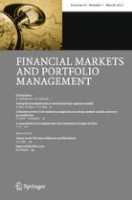
Financial Markets and Portfolio Management
Scope & Guideline
Advancing Knowledge in Finance and Portfolio Strategies.
Introduction
Aims and Scopes
- Financial Market Analysis:
The journal focuses on the dynamics of financial markets, exploring market behavior, price movements, and the impact of various factors on asset prices. - Portfolio Management Strategies:
It covers a wide range of portfolio management strategies, addressing both traditional and modern approaches, including risk management, asset allocation, and performance evaluation. - Behavioral Finance Insights:
Research on behavioral finance is a significant part of the journal, examining how psychological factors and investor sentiment influence market outcomes and decision-making. - Technological Advancements in Finance:
The journal also investigates the role of technology in finance, particularly the impact of FinTech, machine learning, and algorithmic trading on financial practices. - Sustainable and Climate Finance:
There is a growing emphasis on sustainable finance, including how climate change and ESG (Environmental, Social, Governance) factors affect investment strategies and market dynamics. - Global Financial Trends:
The journal addresses international finance issues, including the effects of globalization on financial markets and the interplay between domestic and foreign investment behaviors.
Trending and Emerging
- Machine Learning and AI in Finance:
Research exploring the application of machine learning and artificial intelligence in financial analysis and portfolio management is rapidly increasing, reflecting the industry's technological advancements. - Sustainable Finance and ESG Factors:
There is a notable rise in studies focusing on sustainable finance, particularly the integration of ESG criteria into investment strategies and the financial implications of climate change. - FinTech Innovations:
The emergence of financial technologies, including blockchain and decentralized finance (DeFi), is becoming a central theme, emphasizing the transformative impact of technology on traditional finance. - Investor Sentiment and Behavioral Biases:
Papers analyzing the effects of investor sentiment and behavioral biases are trending, showcasing an increased interest in understanding how these factors influence market movements. - Impact of Political and Economic Events:
Research examining the effects of political connections, economic shocks, and global events on market behavior is gaining traction, indicating a broader interest in the interplay between finance and socio-economic factors.
Declining or Waning
- Traditional Asset Pricing Models:
There appears to be a waning interest in traditional asset pricing models, as newer methodologies and machine learning approaches gain traction in the academic discourse. - Commodity Market Analysis:
Research specifically focused on commodity markets, such as oil and gold prices, has decreased, possibly due to shifting attention toward digital assets and other emerging markets. - Regulatory Impact Studies:
While important, studies examining the effects of regulatory frameworks on financial markets are becoming less frequent, as the focus shifts toward more immediate and practical financial technologies. - Classic Behavioral Finance Theories:
Although behavioral finance remains relevant, classic theories are being overshadowed by new insights from machine learning and data analytics that offer fresh perspectives on investor behavior. - Local Market Dynamics:
There is a noticeable decline in papers focusing solely on local or regional market dynamics as the journal expands its scope to include more global and comparative analyses.
Similar Journals

FINANCIAL REVIEW
Illuminating Contemporary Financial Issues with Scholarly RigorFINANCIAL REVIEW, a premier journal in the fields of Economics and Finance, is published by Wiley and has been contributing to the body of knowledge since its inception in 1969. With an impressive track record reflected by its Q1 ratings in both Economics and Econometrics as well as Finance, this journal stands out as a crucial resource for researchers, professionals, and students alike. The journal hosts a diverse array of scholarly articles that not only address contemporary financial issues but also provide innovative insights into economic theories and practices. Although it does not offer open access, its high impact factor and strong Scopus rankings—ranking #275 out of 716 in Economics and Econometrics and #125 out of 317 in Finance—underscore its significance in advancing academic discourse and influencing policy in the financial sector. Researchers are encouraged to explore the latest findings and methodologies shared in this esteemed journal, ensuring they remain at the forefront of their fields.

Australasian Accounting Business and Finance Journal
Exploring Contemporary Issues in Business and FinanceThe Australasian Accounting Business and Finance Journal, published by the University of Wollongong, serves as a premier open access platform since 2007 for scholars and practitioners in the realms of accounting, business, and finance. With ISSN 1834-2000 and E-ISSN 1834-2019, this esteemed journal is based in Wollongong, Australia, and has been recognized for its impactful contributions, boasting a Q2 quartile ranking in Business, Management, and Accounting, and a Q3 ranking in Finance as of 2023. The journal has made significant strides in the fields of Economics, Econometrics, and Finance, with commendable Scopus rankings, underscoring its relevance and influence. The journal primarily aims to provide a rigorous forum for innovative research that fosters critical discussions and advancements in these disciplines, making it an invaluable resource for researchers, educators, and students seeking to explore contemporary issues and develop future inquiries.
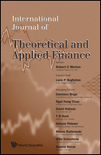
International Journal of Theoretical and Applied Finance
Exploring the intersection of theory and practice in finance.International Journal of Theoretical and Applied Finance is a distinguished publication in the field of finance, serving as a critical platform for the dissemination of innovative research and theoretical insights since its inception in 2003. Published by World Scientific Publishing Co Pte Ltd in Singapore, this journal boasts an impressive Q2 ranking in the realms of Economics, Econometrics, and Finance (miscellaneous) and a solid Q3 status in Finance for 2023. With a commitment to advancing knowledge in the complex world of theoretical frameworks and applied financial practices, it welcomes original research articles, comprehensive reviews, and case studies that explore varied facets of finance. Researchers, professionals, and students benefit from the journal's rigorous peer-review process and an ever-expanding repository of knowledge, making it an indispensable resource in the financial academic community. The journal does not currently offer open access, reflecting its selective approach to publishing high-quality content aimed at a specialized audience.

Financial Innovation
Exploring New Frontiers in Finance and ManagementFinancial Innovation, published by Springer, is a premier open access journal that has been contributing to the fields of finance and management of technology and innovation since its inception in 2015. With an impressive Q1 category ranking in both Finance and Management of Technology and Innovation, the journal places itself at the forefront of academic research, reflected in its Scopus rankings—#17 out of 317 in Finance (94th percentile) and #29 out of 289 in Management of Technology and Innovation (90th percentile). Centered in Germany, this journal aims to disseminate high-quality research that fosters theoretical and practical advancements within its scope, encouraging exchanges between academia and industry. The open access model enhances visibility and accessibility of published research, thus playing a critical role in shaping the future of financial practices and technology management. For researchers, professionals, and students alike, Financial Innovation remains essential for staying abreast of cutting-edge developments and trends in these dynamic fields.

Annals of Finance
Fostering Innovation in the World of FinanceThe Annals of Finance, published by Springer Heidelberg in Germany, stands as a pivotal journal within the realms of Economics, Econometrics, and Finance. With a dedicated convergence of research from 2005 to 2024, this esteemed publication features thought-provoking articles that address both theoretical and practical aspects of finance, earning it a commendable Q2 category ranking in the 2023 metrics for both Economics, Econometrics and Finance as well as Finance. The journal serves an essential role in disseminating knowledge and fostering advancements in the field, appealing to researchers, professionals, and students alike. Its rigorous peer-review process ensures the integrity and quality of published works, making it a reliable source for cutting-edge findings and discussions within the finance community. For those looking to navigate the complexities of modern finance through rigorous research, the Annals of Finance is an invaluable resource.

Journal of Alternative Investments
Navigating the evolving landscape of investment strategies.The Journal of Alternative Investments, published by PAGEANT MEDIA LTD, is a prominent academic journal dedicated to the interdisciplinary field of finance and economics, with a specific focus on innovative investment strategies and asset classes. With an ISSN of 1520-3255 and an E-ISSN of 2168-8435, this journal is recognized for its rigorous peer-reviewed articles that delve into empirical and theoretical aspects of alternative investments. Although it currently does not offer open access, the journal serves as an essential resource for researchers and practitioners, showcasing high-quality contributions that can shape investment practices. Operating within the Q3 category as per the 2023 ranking in both Economics and Finance, it holds significant relevance in a rapidly evolving economic landscape. From its base in the United States and extending its influence globally, the Journal of Alternative Investments aims to provide insights that foster dialogue and a deeper understanding of alternative investment domains from 2007 to 2024 and beyond. Whether for academic research or professional application, this platform invites scholars, students, and investment professionals to explore the dynamic and crucial conversations shaping finance today.
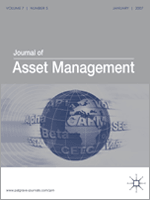
Journal of Asset Management
Elevating Asset Management Practices Through ScholarshipThe Journal of Asset Management, published by Palgrave Macmillan Ltd, is a premier academic journal dedicated to advancing the fields of asset management, business strategy, and international management. With an ISSN of 1470-8272 and an E-ISSN of 1479-179X, this journal has established its reputation as a vital resource for researchers, professionals, and students alike. Operating from the United Kingdom, it spans a convergence of scholarly contributions from 2009 to 2024, positioning itself prominently in the academic landscape. In 2023, it achieved a remarkable Q2 ranking in three key categories: Business and International Management, Information Systems and Management, and Strategy and Management. The journal's Scopus ranks further reflect its impact, featuring positions within the top percentile for relevant academic disciplines, emphasizing its importance and influence. While it currently offers traditional subscription-based access, the journal remains committed to disseminating vital research that shapes best practices in asset management. Researchers are encouraged to engage with the cutting-edge findings published herein, making it an essential tool for anyone looking to deepen their understanding of asset management dynamics and strategic decision-making.
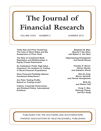
JOURNAL OF FINANCIAL RESEARCH
Bridging Theory and Practice in FinanceThe JOURNAL OF FINANCIAL RESEARCH, published by WILEY, stands as a pivotal platform for disseminating innovative research in the fields of finance and accounting since its inception in 1978. With an ISSN of 0270-2592 and an E-ISSN of 1475-6803, this journal aims to address contemporary challenges and trends within the financial research landscape. It has achieved notable recognition, being placed in the Q2 category for both Finance and Accounting in the 2023 rankings, signifying its relevance and impact within the academic community. Although it does not currently offer open access, the journal is accessible through various academic databases, catering to a diverse audience of researchers, professionals, and students keen on advancing their knowledge and understanding of financial systems and methodologies. With an evolving scope that encompasses empirical studies, theoretical frameworks, and practical applications, the JOURNAL OF FINANCIAL RESEARCH is committed to contributing valuable insights into the complexities of financial practices and policies.

Pacific-Basin Finance Journal
Connecting Research and Practice in Pacific FinancePacific-Basin Finance Journal is a prestigious academic journal that focuses on critical developments and innovative research within the fields of finance and economics, specifically tailored to the Pacific region's unique economic landscape. Published by Elsevier, the journal boasts an impressive impact factor and is categorized in the Q1 quartile for both Economics and Econometrics and Finance as of 2023. This indicates its high relevance and position among the top journals in its field, with Scopus rankings reflecting a strong standing in the competitive landscape of finance research, holding the 45th position out of 317 in Finance and the 108th in Econometrics. Established in 1993, the journal is committed to disseminating rigorous theoretical and empirical research findings that enhance the understanding of financial systems in the Pacific Basin. Although the journal is not open access, it provides invaluable insights and comprehensive studies aimed at professionals, researchers, and students alike, fostering a deeper comprehension of the region's economic dynamics and global interconnectedness.
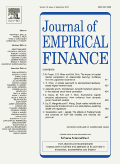
Journal of Empirical Finance
Driving innovation in finance with evidence-based studies.Journal of Empirical Finance, published by Elsevier, stands as a key resource in the areas of finance and economics, with a definitive focus on empirical studies. As a prominent journal since its inception in 1993, it has made significant strides in contributing to the academic community, evidenced by its soaring categorization in Q1 for Finance and Q2 for Economics and Econometrics as of 2023. With an ISSN of 0927-5398 and an E-ISSN of 1879-1727, the journal emphasizes robust, data-driven analysis to inform both theoretical and practical aspects of financial research. While access options do not include open access, the journal ensures that its content remains accessible to a diverse audience of researchers, professionals, and students. It fosters a platform for innovative research and discourse, significantly impacting the fields of finance, economics, and econometrics. The Scopus rankings further bolster its reputation, placing it in the 61st percentile in both categories, reflecting a commitment to high-quality research output. As the journal continues to evolve, it invites contributions that push the boundaries of empirical finance, enabling a deeper understanding of financial mechanisms that drive global economies.